Euro 2024: How to follow England and Scotland in Germany this summer – and what to do in each city
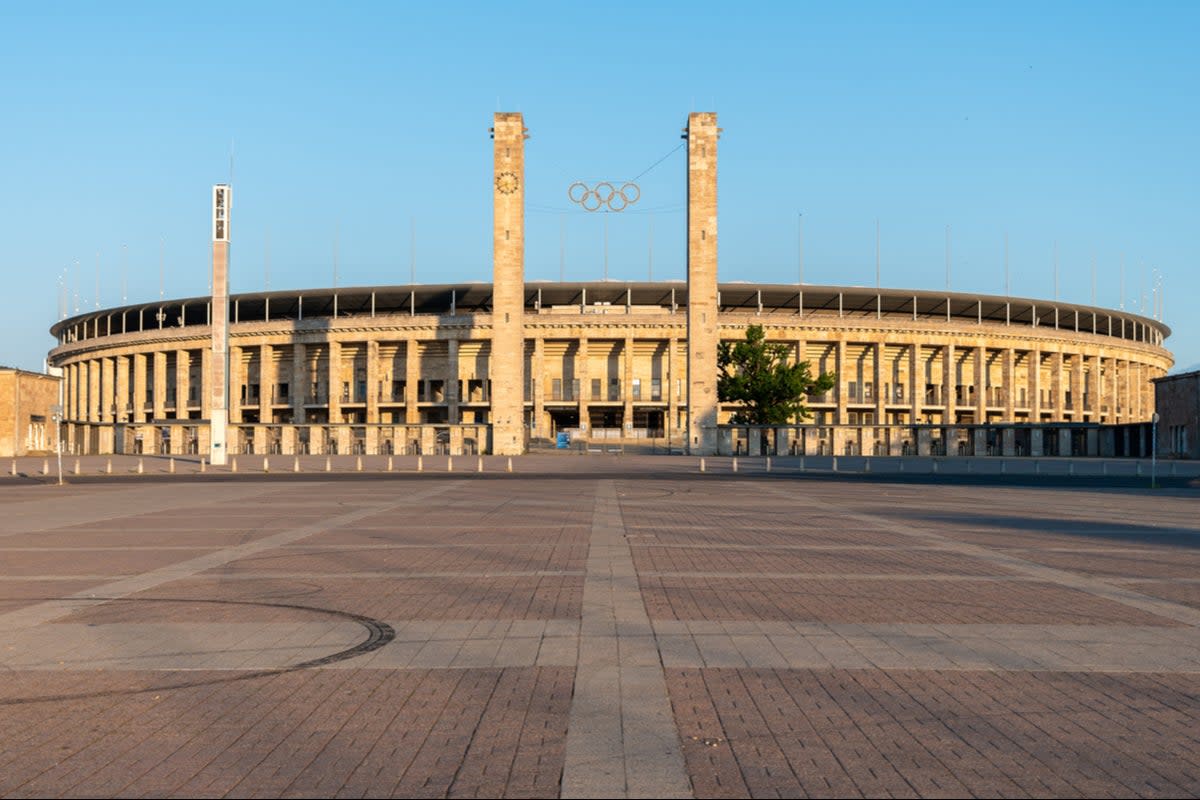
The stage is set for Europe’s summer festival of football: the Euro 2024 finals in Germany. We now know all the teams who have qualified for the continent’s greatest football tournament, and when and where they will play their opening matches.
England and Scotland qualified emphatically. Sadly, Wales went out on penalties to Poland, who along with Georgia and Ukraine were last to qualify.
Euro 2024 kicks off in Munich on Friday 14 June and ends with the final in Berlin on Sunday 14 July.
Many fans will want to travel to Germany. Whether you are planning a midsummer’s dream trip to support your team or just want to soak up the atmosphere, these are the key questions and answers.
The venues?
Berlin Olympiastadion (capacity 70,000)
Munich Football Arena (67,000)
Dortmund BVB Stadion (66,000)
Stuttgart Arena (54,000)
Gelsenkirchen Arena AufSchalke (50.000)
Hamburg Volksparkstadion (50,000)
Cologne Stadium (47,000)
Dusseldorf Arena (47,000)
Frankfurt Arena (46,000)
Leipzig Stadium (42,000)
Read more on Europe travel:
Where and when are Scotland’s group-stage games?
14 June v Germany in Munich (the tournament’s opening match)
19 June v Switzerland in Cologne
23 June v Hungary in Stuttgart

Where and when are England’s group-stage games?
16 June v Serbia in Gelsenkirchen
20 June v Denmark in Frankfurt
25 June v Slovenia in Cologne
What are the basic travel mechanics?
Fortunately for supporters of England and Scotland, all the games – except for the opening match between Germany and Scotland in Munich – are in western Germany.
For Cologne, where England will play Slovenia and Scotland will play Switzerland, surface travel looks best: ideally a Eurostar train from London to Brussels and a connection from there.
But it will be much cheaper for groups of supporters to go by road. Many people will take cars across, and the Dover-Dunkirk or Harwich-Hook of Holland ferries are probably best – though Newcastle to Amsterdam and Hull to Rotterdam are also feasible, if expensive.
There’s a wide choice of flights on budget airlines from across England and Scotland to Germany, but they won’t be low-cost during the tournament for key games. It could be smart to fly to somewhere close to Germany instead.
For example, to reach Gelsenkirchen, the venue for England’s first game against Serbia, Eindhoven in the Netherlands is an option. Remarkably, for those flying out on 15 June and returning on 17 June, Ryanair has flights between London Stansted and Eindhoven for £15 each way.
For Scotland’s game against Hungary on 23 June in Stuttgart, you could fly on easyJet from Edinburgh to Basel in Switzerland and get a cheap train from there; out on 21 June, back on 24 June is currently £184 return.
Will travelling around the host nation be easy?
Yes, because German Railways has a vast, high-density network, with low fares if you don’t take the fastest expresses.
There is no real need to book anything in advance – you can buy tickets on the day. The network will feel the strain on match days, but trains will be supplemented by long-distance coaches.
If you’re driving your own car, the autobahns will be busy – and you will also find parking in cities and near venues difficult.
All ticket holders will get 36 hours of free local transport around each match.
Which brings us to the thorny question of tickets...
All group-match tickets have been sold, and the Uefa resale platform has now closed. The organisers say “There will be no further opportunities to resell tickets.”
Uefa adds: “Tickets reserved for knockout-stage matches will be sold during the tournament upon the qualification of the teams for the respective matches.”
Or you can settle for the fan zones – which will be in attractive locations such as Cologne’s old town, the Altstadt.
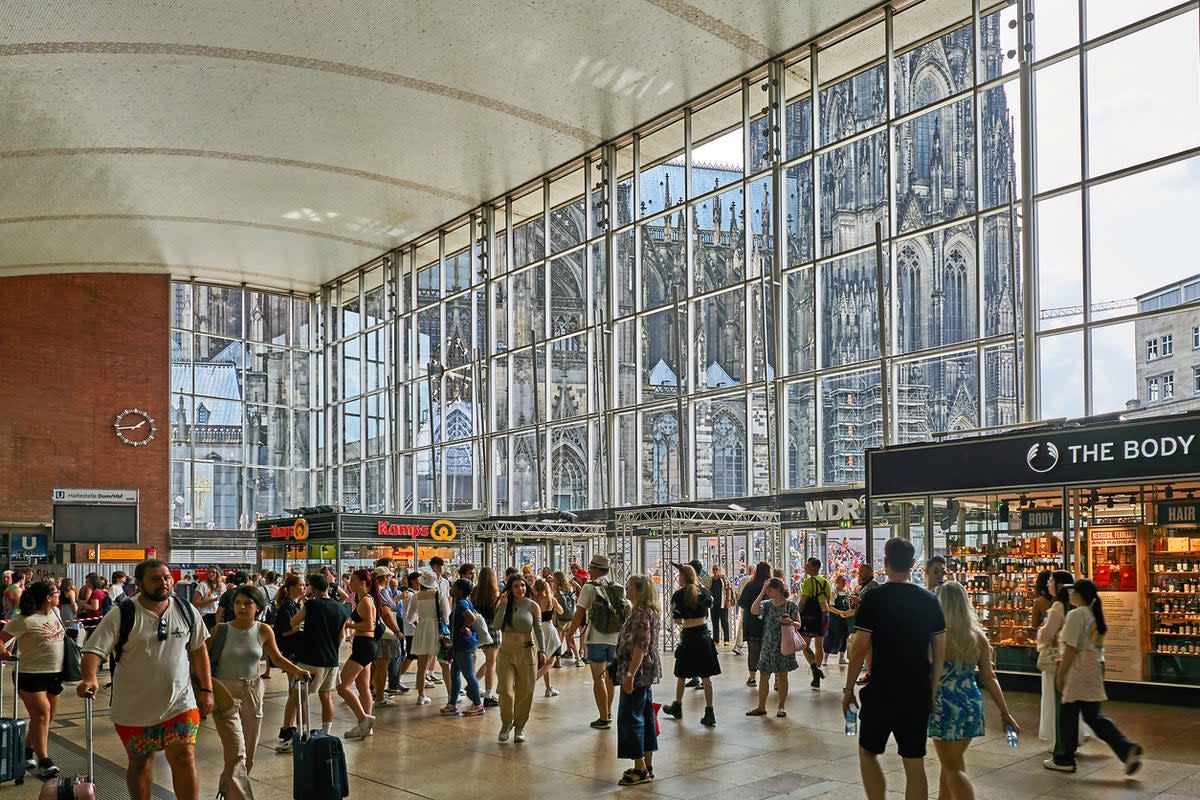
What about accommodation?
Unlike Paris, where hotel rates are steadily falling ahead of the Olympic Games, demand for rooms in and near host venues is rising – along with prices. For many fans, Germany is extremely accessible.
In Cologne, on the night of Scotland’s group game against Switzerland (19 June), many properties are sold out, and basic budget hotel rooms are selling for £400.
But you can save approximately half the cost by booking in Dusseldorf, about 20 minutes by train from Cologne. Go further, to Aachen (less than an hour away), and rates halve again.
While many Berlin hotels are sold out on the night of the final, a very good hotel room in Leipzig (the Amano Home) is only €79 (£69) on the night of the final, with trains taking 75 minutes to reach the German capital.
Is it worth waiting until the knockout stages?
Quite possibly. A valid strategy is to do nothing now and see if England and Scotland progress beyond the group stage. From then onwards, everything becomes easier – pressure on transport and accommodation eases because lots of fans sadly go home.
Over the four-day spell of the quarter-finals, from 29 June to 2 July, could be the prime time to be in Germany.
And, if you are feeling optimistic, you could even book a cheap flight to Berlin for the final on 14 July. Ryanair is currently selling flights on 11 July, returning on 16 July, for just £137 from Edinburgh to the German capital.
What shall I do between the matches?
This guide focuses on the England and Scotland host cities, in order of their matches. But the best of the rest will follow.
Munich (Scotland v Germany, 14 June)
See
The Bavarian capital is the favourite German city of many travellers. The Altstadt, the old town, has the beautiful Marienplatz – dominated by the neo-Gothic Neues Rathaus (new town hall), which stretches across its northern side. Shortly before 11am and noon each day, crowds gather for a glockenspiel performance that features a Bavarian knight beating a French challenger in a jousting tournament. For the best view of Munich (and, on a clear day, the Bavarian Alps), visit the tower of St Peter’s Church, just south.
Eat and drink
Warm summer evenings will mainly be spent on cafe terraces and in beer gardens, but the state-owned Hofbrauhaus is well worth visiting for the dizzying choreography of the well-attired waiting staff and the conviviality of the location – augmented from time to time with all the oompah you would expect from a Bavarian band.
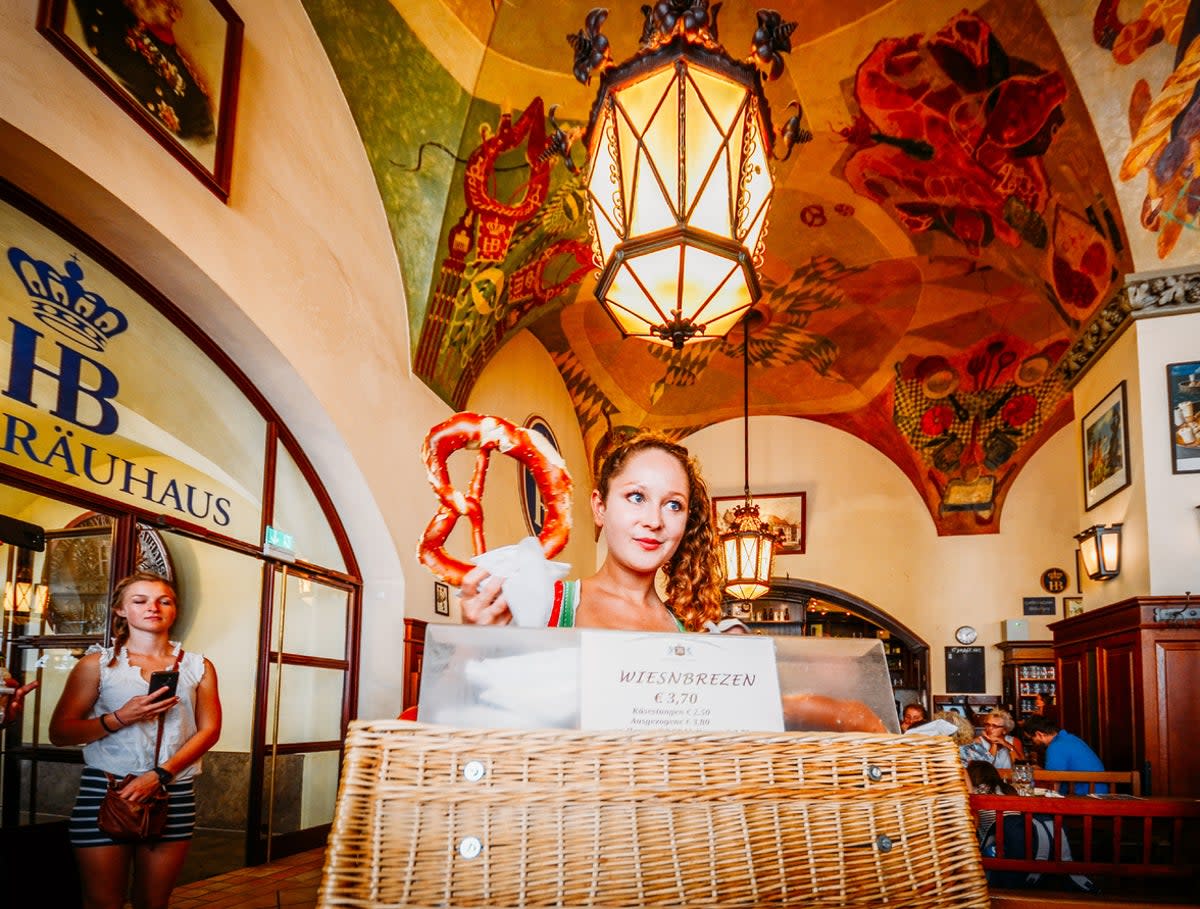
Gelsenkirchen (England v Serbia, 16 June)
See
The Ruhr is off many tourists’ itineraries, but the former coal and steel hub for Germany’s economic and military might is fascinating. Gelsenkirchen itself is actually little more than a northern suburb of Essen (don’t show this to any locals). The industrial archaeology is remarkable, with much of the former Zollverein coal mine handed back to nature – and visitors. You can clamber, carefully, around this Unesco-listed gem. And the German Football Museum is just minutes away in Dortmund (see below).
Eat and drink
Essen in central Essen: it is difficult to go wrong, but I like the Pfefferkorn Essen. South of the city centre, Il Pomodoro is a reliable Italian.
Cologne (Scotland v Switzerland, 19 June; England v Slovenia, 25 June)
See
Cologne is a city designed for walking. Start by climbing the bell tower of the dom (cathedral); the 509 steps are challenging, though you can pause halfway up to admire the glocken (bells). From the public gallery at a height of 97m, you get a fine view of the old town – and some ungainly modern buildings that were erected after the Second World War, in which 90 per cent of the city was destroyed. The Museum Ludwig, adjacent to the dom, celebrates modern art by the likes of Dali and Warhol. For 19th-century works and earlier, the Wallraf-Richartz-Museum is a dramatic modern structure.
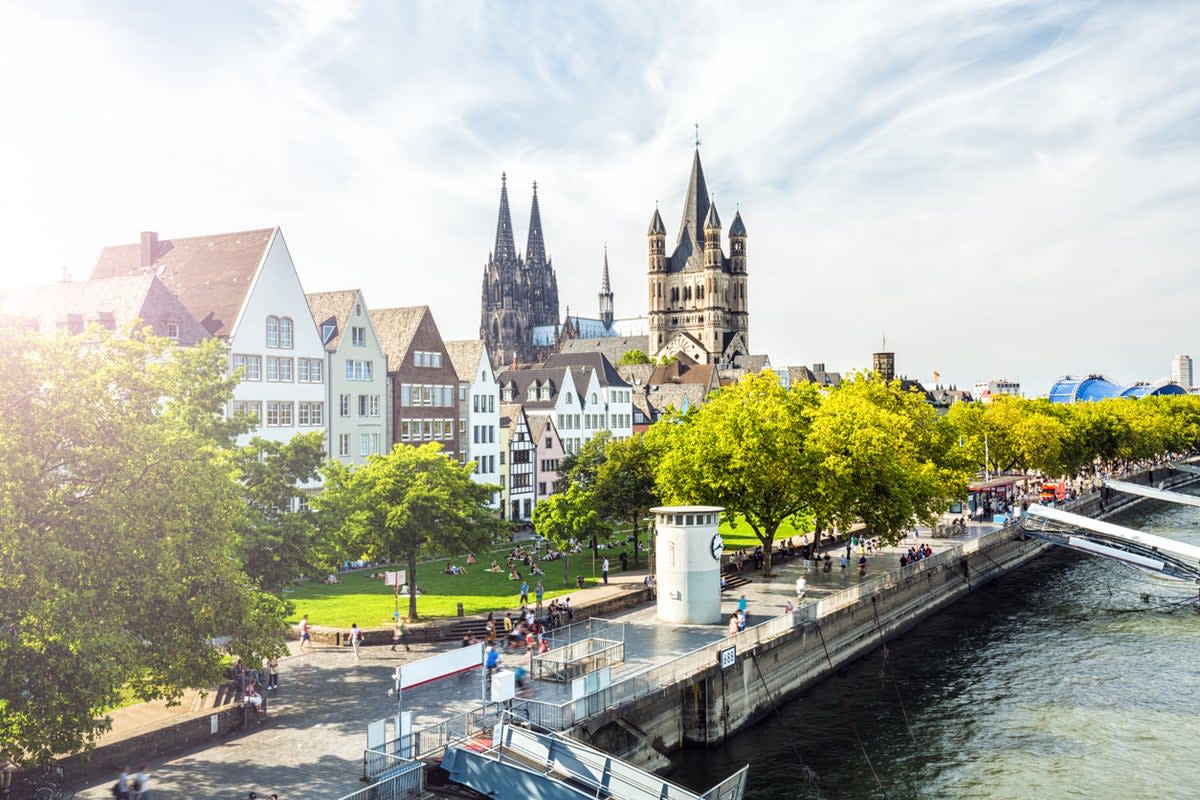
Eat and drink
Eating, drinking and shopping are the main interests of the locals in what is arguably Germany’s friendliest big city. The local Kolsch beer – light and well hopped – will cheer even losing fans. The tastiest brand is Gaffel, whose home ground is the Gaffel Haus on Alter Markt. But the atmosphere is even more convivial at the Brauhaus Sion, which also serves up sauerbraten: beef marinated for what seems like months, which melts in your mouth in minutes.
Frankfurt (England v Denmark, 20 June)
See
Europe’s financial hub is far more rewarding than you might imagine. It has a traditionally restored old town, complete with the chance to ascend the tower of St Bartholomew’s (location for medieval coronations of holy Roman emperors), though with some questionable 1960s embellishments. Among the wealth of attractions in this wealthy city: Goethe’s House, where the national poet was born in 1749.
Eat and drink
Goethe could have been talking to football fans when he wrote: “If you’ve never eaten while crying you don’t know what life tastes like.” Cross one of the bridges to go south of the Main and sample ebbelwei – apple wine, a cousin of cider – in Ebbelwoi Unser, where you can also dine on sausage, dumplings and sauerkraut.
Stuttgart (Scotland v Hungary, 23 June)
See
The capital of Baden-Wurttemberg, a big, prosperous southwestern state, feels different from many other German cities: with hilly surroundings and a sense of space, it is a location for getting out and about. Top attraction: the Mercedes-Benz Museum. But if you want to be alone after the match, try Schloss Solitude, just west of the city.
Eat and drink
Could this be Germany’s most amazing bar? Jigger & Spoon is a modern take on the speakeasy bar, two floors below the city streets in the vault of a bank, which you reach by going into the office block at Gymnasiumstrasse 33 and taking the lift down two floors. Somehow it includes a cigar lounge. For dinner, the Stuttgart Rathskeller in the basement of the city hall is unbeatable.
Best of the rest – Simon Calder’s top recommendation for each of the other host cities
Berlin
The wall may have come down in 1989, but 35 years on, the scars of the division of the German capital are still evident. The Palace of Tears at Friedrichstrasse railway station, where people checked out of East Germany to the West, is now a museum, and provides a profoundly emotional experience.
Dortmund
Controversy drags on about England’s third goal in the 1966 World Cup Final: the German Football Museum even has a special investigation into the linesman’s questionable decision against West Germany, using an interactive media station. Unsurprisingly, there is rather more focus on the occasions when German players won the Weltmeisterschaft (in 1954, 1974, 1990 and 2014).
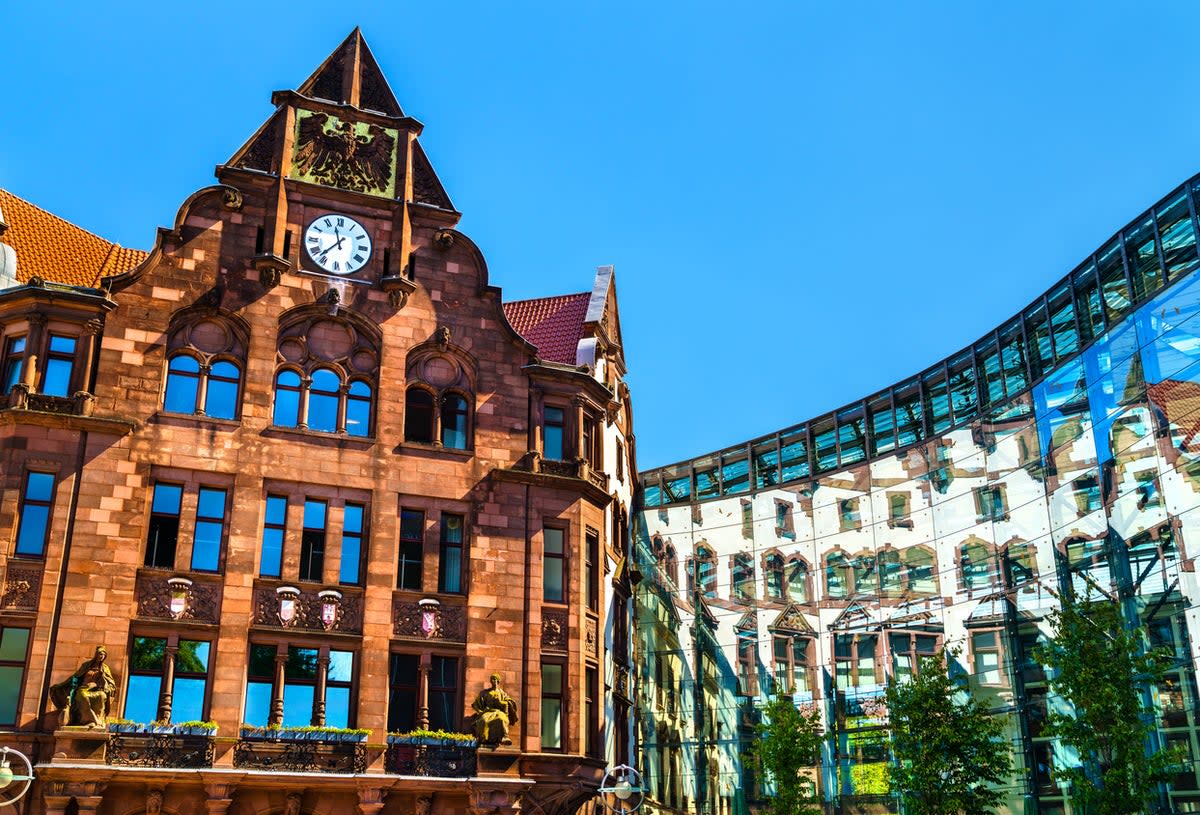
Hamburg
The Church of St Nicholas was built in 1874 by the great British architect Gilbert Scott. It was devastated during the Second World War by Allied bombers, but the spire survived and remains one of Europe’s tallest church structures. The crypt contains a small museum commemorating the wartime destruction of Hamburg and the victims of the Third Reich. Nearby, visit Altona Fischmark, the ornate fish market where The Beatles used to breakfast after their all-night shows on the Reeperbahn.
Dusseldorf
One of Germany’s most rewarding cities owes much of its beauty to the Rhine; a riverside highway is now confined to a tunnel. Take the Weisse Flotte €20 Panorama-Fahrt (no sniggering, please) to appreciate the setting and learn more about the monuments.
Leipzig
In this fine East German city, do mention the Cold War. The Zeitgeschictliches Forum focuses on four decades of state communism. You are taken through the whole sorry story, from the Nazi era via the postwar carve-up of Germany decided in Potsdam, and spy cameras disguised as cigarette packets, to the night in 1989 when the Berlin Wall came down.
